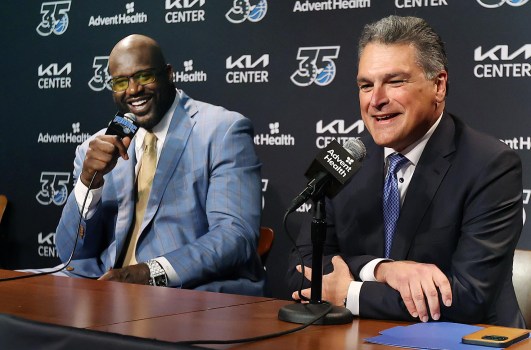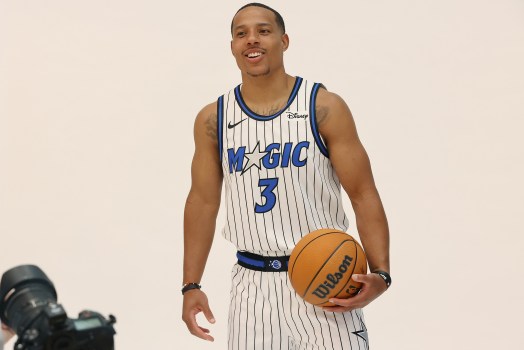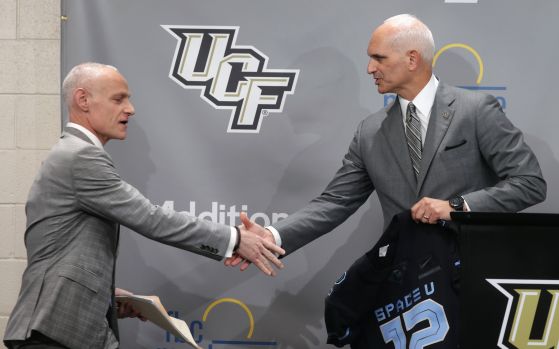In the results-driven world of sports, where winning percentages, banners, and rings are frequently used to define legacy, Alex Martins leaves his position as CEO of the Orlando Magic with something much more complex and, possibly, even more significant than a championship trophy:
kindness, reliability, and dedication to a cause greater than basketball.
The Orlando Sentinel has learnt that Martins is leaving the Magic, where he has been for the past 14 years, to take on the newly formed role of vice chair. This comes as club ownership starts to usher in the next generation of DeVos family leadership.
Since Martins is no longer in charge of the team’s daily operations, Ryan DeVos and Charlie Freeman assume more senior leadership positions. Entering his 30th season with the Magic, Freeman will take over as the team’s principal financial architect as the new President of Business Operations.
Without a doubt, though, this is also an attempt to further position Ryan DeVos, the grandson of the late owner Rich DeVos, to lead the ownership group in the future. In his new position as managing director, he will collaborate closely with the Magic Board of Directors, Freeman, and Jeff Weltman, President of Basketball Operations. At the start of the 2025–2026 season, Cole DeVos, another grandson of Rich DeVos, will move to Orlando to join the management group.
According to Martins, this is a chance for the third generation of the DeVos family to become more active in the company and begin to participate in daily decision-making.
Since Martins, 61, approached ownership two years ago and informed the DeVos family that he wanted to leave the rigors of serving as the franchise’s CEO, all of this has been part of the plan. It’s a polite departure, but it’s not a farewell for Martins. In a sense, it’s him doing what he’s always done best—working in the background to influence Orlando’s and the Magic’s future.
It’s okay and reasonable for some people to draw comparisons between Martin’s legacy and playoff droughts and lottery purgatory. Sports are that. It would be a fundamental misunderstanding of Alex Martins’ influence on a community as well as a team to characterize him solely by the Magic’s win-loss record.
Although Martins’ tale started much earlier, he was formally appointed CEO of the Magic in December 2011. He was first employed by the Magic in 1989 and rose through the ranks to become the unique executive whose name was associated with almost every facet of the organization, including partnerships, media, operations, philanthropy, and civic involvement. It wasn’t merely a promotion when he was eventually promoted to the top position. It was a fire baptism.
Once the league’s toast thanks to a youthful Dwight Howard and a 2009 NBA Finals appearance, the Magic were in decline. Rich DeVos’ son-in-law and team president at the time, Bob Vander Weide, was the victim of a divorce from the owner’s daughter and a struggling franchise.
Martins was left to clean up a disaster, with a fan base witnessing their aspirations come crashing in real time, a beloved and respected coach (Stan Van Gundy) on the verge of being uncomfortably fired, and a franchise superstar publicly requesting a trade.
Martins’ decisions weren’t always correct. In a risky move that resulted in a half-decade of basketball obscurity, he appointed Rob Hennigan, the youngest general manager in league history, to oversee the reconstruction. In an attempt to reclaim the grandeur of the Shaq-Penny and Dwight eras, the Magic switched coaches, rosters, and regimes. And with all of this, the playoffs started to become more of a rumor than a destination.
Martins oversaw one of the least productive on-court eras in the team’s history, with just three winning seasons and no postseason series wins in 14 seasons. He did, however, also replace Henningan with Weltman, the highly regarded team president, whose shrewd drafting appears to have the squad poised for long-term success.
Martin’s biggest influence, in my opinion, was felt in the community. He was the primary force behind the Kia Center’s construction through a public-private collaboration. It was a high-stakes financial and political maneuver that required careful talks between Orange County, the Magic, and the city of Orlando. Martins succeeded, transforming downtown Orlando’s landscape in the process.
Together with Weltman, he was in charge of the planning and building of the Magic’s AdventHealth Training Center, a $70 million investment in a run-down downtown area that is regarded as the NBA’s most state-of-the-art practice and training facility.
Basketball has never been the only topic. That’s what Martins ensured. When he acquired the company 35 years ago, Rich DeVos declared, “Don’t call us the owners of the franchise; call us the caretakers of the franchise.” He frequently refers to this statement. The community and supporters are this team’s true stakeholders.
“Mr. DeVos instilled that philosophy in all of us,” Martins says. He believed that it was our duty to serve as pillars and capable leaders in the community.
As the chair of the Orlando Magic Youth Foundation, Martins assisted in awarding over $30 million in grants to over 500 charity organizations in the area. An estimated 100,000 children are impacted by those initiatives each year. It’s more than just a number. That is what a franchise is all about.
Following the tragic massacre at the Pulse nightclub, Mayor Buddy Dyer asked Martins to head the OneOrlando Fund. It was a serious task during a time of sorrow for the entire community. Tens of millions of dollars were raised by Martins for the tragedy’s victims, families, and survivors.
He assisted in creating the NBA’s bubble at Walt Disney World during the COVID-19 pandemic, a logistical wonder that allowed the league to safely resume play without fear of widespread outbreaks. The NBA bubble became a global model in addition to being successful.
As UCF’s Chairman of the Board of Trustees, Martins also worked behind the scenes to help the university get into the Big 12, which launched the Knights into a new era of national prominence. He was just voted to a second term as chairman of the board.
Additionally, under Martins, the Magic’s commercial side flourished while their on-court product occasionally faltered. Magic fans continued to purchase tickets at a remarkable pace even during the difficult years. Martins oversaw a thorough reorganization of the team’s commercial operations, resulting in record-breaking increases in ticket sales, sponsorships, and media value. The Magic were the only team in the NBA, NFL, MLB, or NHL to be named one of the Best Places To Work in Sports by Sports Business Journal in March 2024. That is not a coincidence. When a culture is intentionally created, that is what occurs.
According to Martins, it begins with our employees. I’ll pit any professional athlete against our staff.
Indeed, it’s simple to see executives only from one perspective: Did your team win? However, the reality is more complex in professional sports, particularly in places like Orlando: Have you expanded the franchise? Did you make the city better? Did you provide assistance to the community when it most needed it?
Martins fulfills each of the requirements.
He s been an ambassador, a negotiator, a fundraiser, a visionary, a steward and when the DeVos family needed him to be a shield from public criticism.
The scoreboard might not always convey your story when you construct arenas, support charity organizations, or guide a franchise through significant civic, cultural, and economic events.
Few people have contributed more to Orlando or grown with it in a city known for its expansion than Alex Martins.
Not a parade.
No confetti.
There are no rings.
Simply impact.
[email protected] is my email address. Hit me up on X (formerly Twitter) @BianchiWrites and listen to my Open Mike radio show every weekday from 6 to 9:30 a.m. on FM 96.9, AM 740 and 969TheGame.com/listen

































